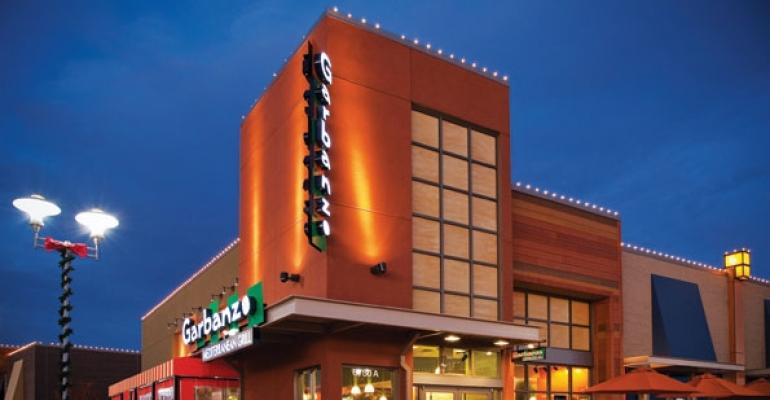![]() Americans have been having a love affair with Mediterranean food for years, appreciating its flavorful dishes and healthful qualities. But is mainstream America ready for Mediterranean fast food like shawarma, laffa, falafel and hummus?
Americans have been having a love affair with Mediterranean food for years, appreciating its flavorful dishes and healthful qualities. But is mainstream America ready for Mediterranean fast food like shawarma, laffa, falafel and hummus?
Alon Mor thinks so.
With 15 company-owned Garbanzo Mediterranean Grills open in Colorado and two franchised units up and running, Mor is eyeing franchise expansion into Texas, Oklahoma and Florida. Five to 10 company- and franchisee-owned locations are slated to open in the first half of 2013, and Mor expects to double that number by the end of the year.
The surging interest in healthful eating, Americans’ fondness for ethnic cuisines and the appeal of authentic foods will help Garbanzo grow nationwide, said the co-founder and chief executive of the Centennial, Colo.-based company.
“As the world becomes a smaller place and it’s easier to travel, [consumers] are discovering ethnic foods, making them easier to transport,” Mor said.
Additionally, he said, the “Mediterranean diet is something very unique. The emphasis on that by physicians and nutritionists has been very, very helpful to us and is helping our category big time.”
![]() Although some in the industry describe Mor’s fast-casual concept as a “Mediterranean Chipotle” for its healthful and customizable menu, the spin is more Middle Eastern street food from Israel, where Mor was born.
Although some in the industry describe Mor’s fast-casual concept as a “Mediterranean Chipotle” for its healthful and customizable menu, the spin is more Middle Eastern street food from Israel, where Mor was born.
Diners can choose a pita, a tortilla-like laffa or a salad as a base. They then can add marinated chicken or steak, known as shawarma; falafel, which is a deep-fried ball or patty made from ground chickpeas; or hummus. They also can order a shawarma kebab. Other toppings include baba ghanoush, tahini and amba, which is a spicy curry sauce.
Garbanzo, which is the Spanish name for chickpea, imports several ingredients, including its tahini, pickles and couscous.
“There’s nothing more authentic than bringing ingredients in directly from the source,” Mor said. “And the taste is different, as well."
Garbanzo is well-positioned to capitalize on the healthful eating trend, but its biggest challenge will be educating consumers, said Andy Barish, managing director of equity research for San Francisco’s Jefferies & Company Inc.
![]() “Education is sort of the key to get people to try it,” Barish said. “Shawarma can sound a little different and foreign for the uninitiated. But once they try it and get a sense of quality and healthy values, I think consumers will gravitate toward it.”
“Education is sort of the key to get people to try it,” Barish said. “Shawarma can sound a little different and foreign for the uninitiated. But once they try it and get a sense of quality and healthy values, I think consumers will gravitate toward it.”
While the Garbanzo concept may play well in big cities with large ethnic populations — and where people have a higher propensity to try new foods — the challenge will be getting an older customer or someone who hasn’t grown up eating hummus to try the restaurant, Barish said.
Mor is well aware of the need for education. The restaurant chain has created a character named Garbanzo, a talking bean, to educate consumers, and it has pared down its offerings, which initially slowed service due to the numerous questions people had. The chain cut salads from 12 to just four and sauces from eight to four, which reduced questions and sped up lines.
Barish cited Mor’s background and the restaurant chain’s investors, Gemini Partners, as keys to its success. Mor started as a floor manager at Panera Bread and eventually opened 25 Paneras during his 10-year tenure. He then pitched Garbanzo to Ken Rosenthal, founder of Panera precursor St. Louis Bread Co. Rosenthal loved the idea, Mor said, and is a co-founder.
Barish said, “With a healthier, better-for-you concept, the right background and an experienced CEO, and now the right partners, ... it seems like 2013 should be a nice breakout year for Garbanzo.”





